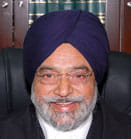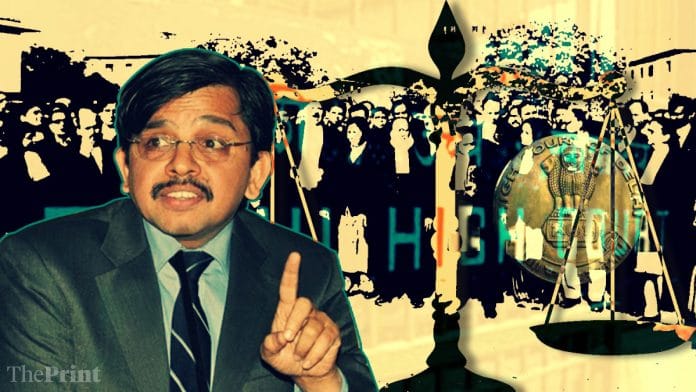The Supreme Court collegium’s decision to transfer Delhi High Court judge S. Muralidhar to the Punjab and Haryana High Court has met with strong opposition from the Delhi High Court Bar Association. It asked its lawyers to refrain from working Thursday. However, ThePrint reported that this objection could be “misplaced” because the judge is likely to eventually take over as the Chief Justice in Chandigarh.
ThePrint asks: Justice Muralidhar transfer: Lawyers out of line to protest against judicial appointments?
Bar associations have stood up when judges have been unfairly treated by the powers that be

Sanjay Hegde
Senior Advocate, Supreme Court
Justice Muralidhar has had an outstanding record since his appointment nearly 13 years ago. He and I are ‘guru-bhais’, who have been trained under the same senior, G. Ramaswamy, though we were not contemporaries in the chamber.
The judiciary consists of the bar and the bench. There is constant peer review in this profession and the bar is reasonably well-aware of the reasons behind judicial and administrative decisions. Lawyers do not benefit from going on strike at the drop of a hat. This strike against Justice Muralidhar’s transfer is one of those occasions when the bar has stood up for a member of the bench.
People may well recall that it was the 2007 lawyers’ strike in Pakistan that overthrew a military dictator when General Pervez Musharraf sought the resignation of Chief Justice Iftikhar Muhammad Chaudhry. Even the judgment of the Supreme Court, which rules against lawyer strikes, recognises that there are some exceptional circumstances.
It was the SC bar association that stood up in protest against the 1973 supersession of three senior judges. Various bar associations have stood up when judges have been unfairly treated by the powers that be. Men and women of law normally do stand up for each other whether they are on the bar or on the bench.
Protesting lawyers setting up a wrong precedent by suggesting that some judges are more acceptable than others
 R. S. Sodhi
R. S. Sodhi
Former Judge, Delhi HC
No lawyer has any right to say which judge should be posted where. They have absolutely no say in the matter as to why Justice Muralidhar is being posted to the Punjab and Haryana High Court or for that matter, why any judge is being posted anywhere.
Through their protest against the Supreme Court collegium’s recommendation to transfer Justice Muralidhar, the lawyers are setting a wrong precedent by suggesting that some judges are more acceptable than others. This is most certainly not the case because all judges are equal and receptacle before the bench.
For a lawyer to suggest which judge should or should not be transferred gives an impression that the lawyer is lobbying, which he/she shouldn’t be doing. Such discussions should be kept away from the normal discourse.
Lawyers should have nothing to do with decisions regarding the appointment of judges. Their license is only to appear before the court and make their case, and of course to keep a watch on cases filed to ensure that justice is not polluted in any manner.
Also read: Protest, rumours and speculation — row erupts over transfer of high court judges
Lawyers entitled to protest, but in Justice Muralidhar’s case, they should respect SC decision
 Ishkaran Bhandari
Ishkaran Bhandari
Advocate
The transfer of Justice Muralidhar from the Delhi High Court to the Punjab and Haryana High Court has been done by the Supreme Court collegium, which has the authority to appoint as well as transfer judges. The SC collegium operates on its own and engages in independent decision-making, something which the executive can’t meddle in.
In the past, judges of other high courts have been transferred, including judges of the Delhi High Court.
There have been long discussions on the transfer policy after being appointed as a judge and being in a high court for a certain number of years. There have also been debates on whether there should be frequent transfer of judges like in civil services and other institutions.
While lawyers are entitled to protest, in Justice Muralidhar’s case, the decision should be respected because it has been made by the top judicial body. Moreover, there are reports that suggest the transfer might have been done for the subsequent promotion of Justice Muralidhar to the Chief Justice of Punjab and Haryana High Court. We should wait for the collegium to handle such judicial matters in its own wisdom.
If courts continue to transfer judges without offering reasons, then judiciary’s independence will be at stake
 Debayan Roy
Debayan Roy
Principal Correspondent, ThePrint
This is not the first time when lawyers of a particular court have decided to abstain from work to protest against the transfer of a judge. However, it is certainly the first time a decision to skip work has been carried out with this precision in the legal community. The Delhi High Court Bar Association not only did not work but also had proxy lawyers in place for all 51 courtrooms to take adjournment dates.
Justice Muralidhar is not only seen as a judge who stood up for civil liberty and the rights of litigants but is also hailed by the fraternity for issuing orders against government agencies. His transfer without the Supreme Court collegium offering any explicit cogent reason only leads to more rumour-mongering, given his seniority is at stake.
When Justice Tahilramani as the Chief Justice of Madras High Court was transferred to the Meghalaya High Court, the Madras Bar Association too had abstained. Although that transfer had led to an untimely resignation. Perhaps, the Bombay Bar Association too would have stood up for its second senior-most judge, Justice Dharmadhikari. However, even if a formal transfer statement was not issued, the judge had resigned and served his last day quietly in court.
Lawyers protesting or skipping work only shows that judges in no way can have punitive transfers for the way they allow their courts to function. If the sword of transfer-without-reasons continues to hang over Indian courts, then the very independence of the judiciary will be at stake.
Also read: No conspiracy, Justice Muralidhar’s transfer to ‘pave way’ for his appointment as CJ
By Taran Deol, journalist at ThePrint







The transfer of judge is incidental to his job. We must see as to whether Justice Murlidhar is happy or not. He is being sent here as first puisne Judge in Punjab and haryana high court. In delhi he us at number 3. He is now at no.2. We must respect the decision of the Government.
My best wishes to Hon’ble Mr.Justice Murlidhar.
This pleasing personality will give fragrance where ever he will go.
Best of luck sir.
Regards.
The protests are everywhere. Can there ever be a decision which will be acceptable to all ? That is why we have systems which have to be implemented by someone. When we decide to question and protest every decision that is anarchy.
If a judge goes from place A to place B, and if he is good will the place B not benefit. Why the benefit must come to place A only ? Someone has to take a call on the suitability of such excellent judge at place or place B. There is such an authority in place. When the reasons are asked for such decisions the motives also come in question.
The arguments of ‘guru-bhais’, appears quite out of place. If we do not want the politicians not to meddle in matters of Judiciary , Bar must also refrain from commenting, well meaning comments could tag the up-right and excellent judges with unnecessary controversies.
It is the lawyers practising in a particular Court who have the best assessment of the caliber and integrity of the honourable Judges. If they are collectively expressing concern, there must be cogent reasons for doing so. At a time when institutions are seeing wear and tear, transparency is valuable . That should include the respected Collegium as well.